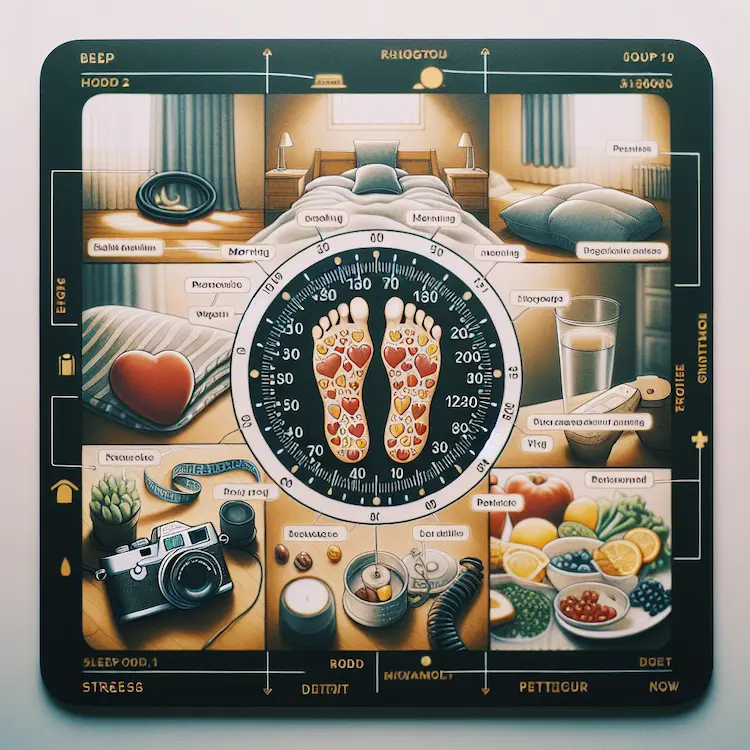Maintaining healthy blood pressure is crucial for overall well-being and longevity. High blood pressure, or hypertension, affects approximately one in three adults in the United States, with about 2 million new cases diagnosed each year. This silent killer can lead to serious health complications if left unchecked. Fortunately, there are simple daily habits that can help keep your blood pressure in check and reduce the risk of associated health problems.
Blood pressure is the force of blood against the walls of your arteries. It is measured in millimeters of mercury (mm Hg) and is typically recorded as two numbers: systolic pressure (when the heart beats) over diastolic pressure (when the heart is at rest). A blood pressure reading of 130/80 mm Hg or higher is generally considered hypertension.
Maintaining healthy blood pressure is essential because uncontrolled hypertension can lead to various health complications, including:
Controlling blood pressure has been shown to reduce the risk of these complications and improve overall mortality rates.

Waking up at a consistent time each day helps regulate your body’s internal clock and promote healthy blood pressure levels. Aim for 7-9 hours of quality sleep per night to support overall cardiovascular health.
Begin your morning by drinking a glass of water. Proper hydration helps regulate blood volume, which can contribute to lower blood pressure. Consider infusing your water with lemon, cucumber, or berries for added flavor and nutrients.
Exercise is a powerful tool for managing blood pressure. Aim for at least 150 minutes of moderate-intensity aerobic activity per week. Morning workouts can be particularly beneficial, as they set a positive tone for the day and boost metabolism.
Types of exercises that can help lower blood pressure:
Chronic stress can contribute to high blood pressure. Incorporate stress-management techniques into your daily routine, such as:
Taking just a few minutes each morning to practice these techniques can help reduce stress levels and promote relaxation.
A nutritious diet plays a crucial role in maintaining healthy blood pressure. The DASH (Dietary Approaches to Stop Hypertension) eating plan is an excellent example of a heart-healthy diet.

Key components include:
Start your day with a balanced breakfast that includes these elements to set a healthy foundation for the rest of your meals.
Use a home blood pressure monitor to check your readings regularly. This practice helps you track your progress and allows you to share accurate information with your healthcare provider. Consistency in monitoring can lead to better management of your blood pressure over time.
While moderate caffeine intake is generally safe for most people, excessive consumption can temporarily raise blood pressure. Similarly, excessive alcohol intake can contribute to hypertension. Limit your morning coffee to one cup and consider herbal teas as alternatives. If you choose to drink alcohol, do so in moderation.
Being overweight or obese increases the risk of high blood pressure. Losing even a small amount of weight can have a significant impact on your blood pressure. Combine a balanced diet with regular physical activity to achieve and maintain a healthy weight.
Smoking is a major risk factor for high blood pressure and cardiovascular disease. If you smoke, quitting is one of the most important steps you can take to improve your overall health and lower your blood pressure.
If you’ve been prescribed blood pressure medications, take them consistently as directed by your healthcare provide. Never stop or change your medication regimen without consulting your doctor first.
Different approaches to managing blood pressure can be effective, depending on individual needs and preferences. Here’s a comparison of some common methods:
| Approach | Effectiveness | Ease of Implementation | Cost |
|---|---|---|---|
| Lifestyle Changes | High | Moderate | Low |
| Medication | High | Easy | Moderate to High |
| Combination Therapy | Very High | Moderate | Moderate to High |
| Alternative Therapies | Variable | Moderate | Variable |
Lifestyle changes, including the habits mentioned above, are often the first line of defense against high blood pressure. They are highly effective and have minimal side effects. Medications can be very effective but may come with side effects and ongoing costs. A combination of lifestyle changes and medication often yields the best results for those with more severe hypertension.
Incorporating these simple daily habits into your routine can significantly impact your blood pressure and overall health. Remember that consistency is key – small, sustainable changes made over time can lead to substantial improvements in your blood pressure readings and reduce your risk of associated health complications.
By prioritizing sleep, staying hydrated, exercising regularly, managing stress, eating a balanced diet, and monitoring your blood pressure, you can take control of your cardiovascular health. If you have concerns about your blood pressure or are considering making significant lifestyle changes, always consult with your healthcare provider for personalized advice and guidance.